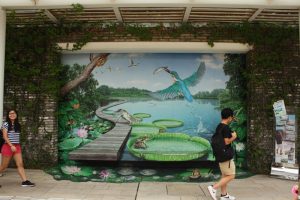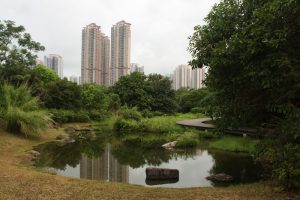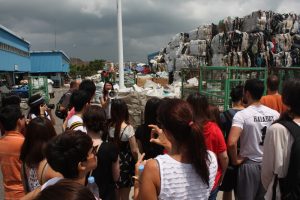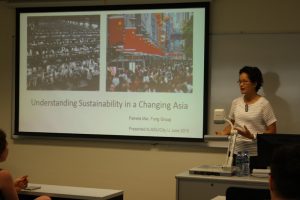
Learning outside of the classroom
Study abroad programs are all about getting outside of a normal classroom, and generally out of your comfort zone, to learn new things that simply can’t be taught in a classroom setting. For example, you could be told how much recycled materials a city processes, or you could visit a recycling center and see stacked up bales of sorted materials probably 20 feet high, and overflowing bags at least four feet high of bottle pumps (like from a soap bottle) of every color.
The reality that field trips bring to sustainability education is an essential component of preparing yourself for finding solutions to these problems, or at least to better equip you for research, presentations and conversations about topics like waste. Many of these facilities are in our own backyards (even in the Phoenix area), for example the Hong Kong Wetland Park we visited just outside the city, is open to the public daily. You can literally see the divergence in land use as the residential skyscrapers loom in the background, while many plant and animals species thrive here, just miles away.
My group focused our research on land use in Hong Kong, so essentially all of the field trips were relevant to our topic because they all consume land. However, we chose to look into the issue of cultural heritage preservation in the context of high land development demands in the extremely dense city. The six of us took an evening to explore one of the areas threatened by redevelopment, most of which has already commenced. Lee Tung Street and Queen’s Road East are (or were) full of historic and cultural shops and flats, relatively mid-rise density and are being redeveloped into five towers. We got to talk to some of the shop owners in the area, one of which said that it’s like they have a cancer; they know their shops are going to die, but they don’t know when. That shocked all of us and in that moment we knew we had selected the right topic to research.
Although we all thoroughly enjoyed the absurd humidity while on these field trips (sense the sarcasm?), it was nice to get back to the classroom to hear from local experts about various sustainability issues that affect and are effected by Hong Kong. One of my favorites was Pamela Mar, who works for Fung Group, a supply chain management company for clothing manufacturers. She broke down the positive and negative aspects surrounding our current system of globalized manufacturing and trade, which is constantly being outsourced to more and more poor countries. One of the most interesting parts of her lecture was a story she told about a specific manufacturing plant they were building in a community, and they were working with the locals to build this facility so that it wouldn’t disrupt their lives. They discovered that people had to walk an hour and a half for clean water, each way every day. As part of the construction, they extended the water pipeline to be closer to the village, a small task for the company to do. Small changes can have massive impacts on multiple lives. I think this message is something our whole class is considering as we try to think of policy solutions that can ensure a more sustainable future for Hong Kong.





